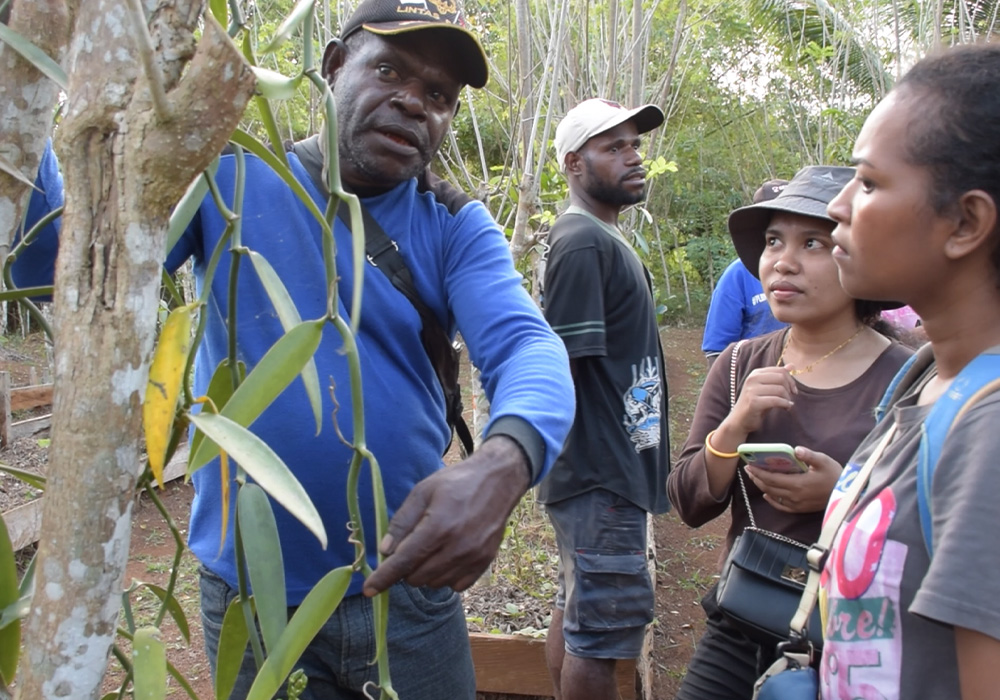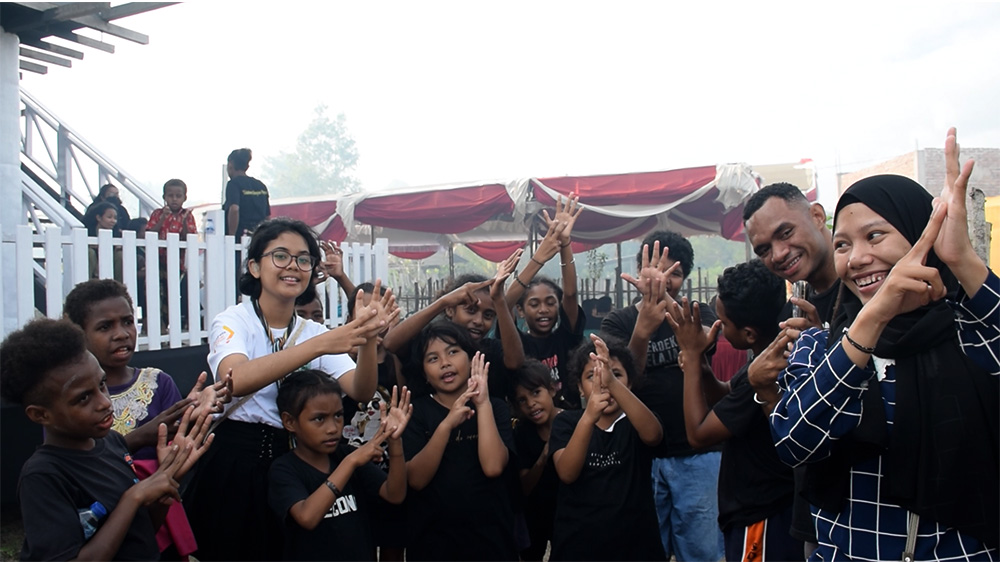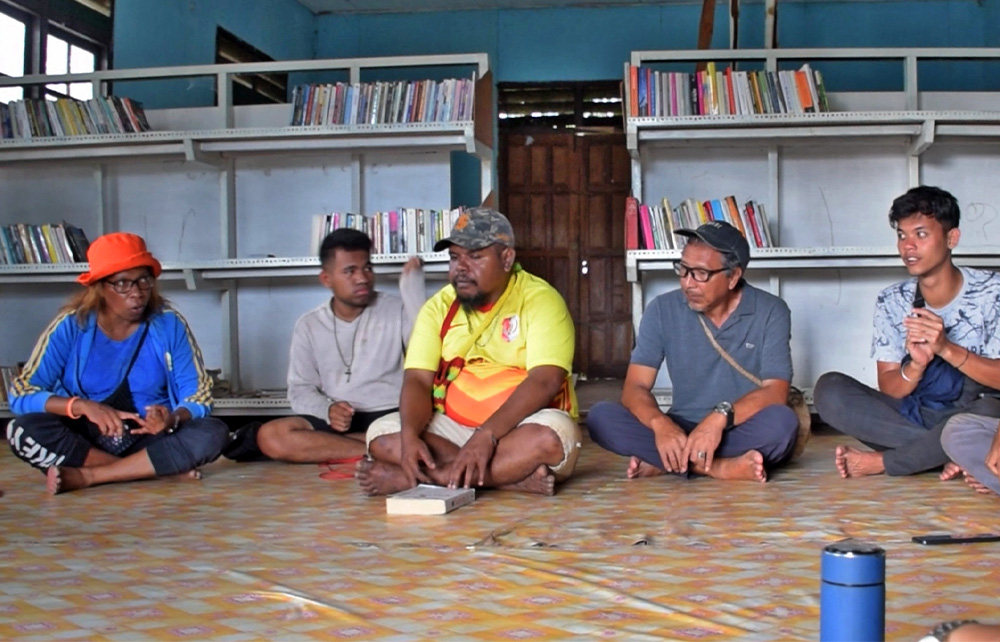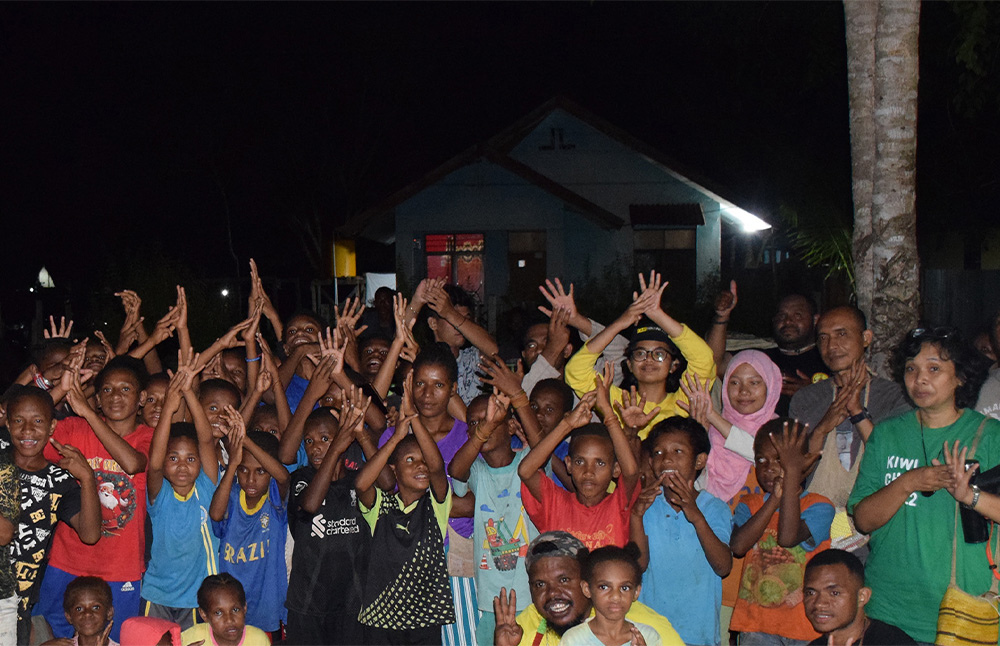
A vanilla farmer explains to the Nokeners that he has developed two variants of vanilla in Sota village: Tahitian Vanilla and Planifolia. (SAMDHANA/Naely)
- admin
- 15 January 2024
- Feature
From Papua For The Archipelago: Connecting Islands Of Experience
From 30 June to 4 July 2023, Samdhana and AnimHa Menoken Team brought a series of Menoken events to South Papua, as part of a campaign called Noken, from Papua for the Archipelago. Through this movement, our aim is to connect Indigenous Peoples in the Merauke region with their counterparts elsewhere in Indonesia.
Over five days, the events brought together Indigenous People, women, youth and persons with different abilities to share their experiences, tackle challenges and explore opportunities to develop the Anim Ha cultural area – one of the three cultural areas in Papua Land that are the focus of Samdhana Lifespace Programmes.
Inclusion: stitching groups together
On the first day, participants of this Menoken event, often called as the Nokeners, met with students of the Sekolah Alam (Nature School) of Papua Paradise Centre in Gudang Arang, Kamahedoga village, Merauke, who used to studying outdoors under a tree – in addition to their regular studies, they get to learn about nature and their connection to the natural world.
With support from Samdhana, and also from CSR of PLN (State Electricity Company), the school has been able to build new classroom facilities, a semi-permanent building and launched officially on 30 June 2023. Moving forward, they hope to obtain Community Learning Activity Centre (PKBM) status, which would enable students to get educational funding assistance from the local government.

The event was a great success, with members from Tuli Jayapura, Tuli Sorong, Tuli Merauke, and the Sorong Deaf Community coming together to share their knowledge with others. It was truly inspiring to see the passion and dedication of everyone involved. One member of this group conducted the national anthem, while others taught the Nokeners sign language.
The group also met with the Katin Sai women’s knitting group; a housewives’ cooperative established by the Papua Paradise Centre Association. Together, they make the distinctive Papuan noken bags that give the Samdhana’s Menoken movement its name. In an interesting mix of old and new, many of the women developed these traditional skills by watching instructional videos YouTube.
The next day, the group travelled to Sota Village, where they met the Kampung Sota farmer group. With support from PERMATA Project through Samdhana and consortium partner Kitong Bisa Foundation, this group of 25 farmers currently manages around five hectares of vanilla plantations in an area surrounding the village.
From beans to books: seeds of positive development
Sota Village is also home to a women's group, who process natural resources such as eucalyptus oil, ants’ nests and honey. Although they continue to use rudimentary tools in their operations, their knowledge and technical skill has allowed them to produce high-quality products.
On the third day, the Nokeners travelled to Kampung Seed Agung, in Muting District. Here they were greeted by Gregorius and Nusra; a pair of farmers from the local community who cultivate Robusta coffee using traditional methods. Like the farmers of Sota Village, their product has begun to achieve recognition in foreign markets.
Next stop on the Menoken trail was the Boven Reading House in Boven Digoel. Founded by Pak Daniel S. Soge in 2020, this facility provides schoolbooks for elementary, junior high and tertiary-level students. Most importantly, the reading house helps foster a love of learning in the surrounding community, through volunteer projects and reading sessions.

The spirit of community and altruism was also plain to see in Sokanggo; the last stop on the trip. Here the Nokeners met with a youth group who are passionate about the cleanliness of their village. Led by Daminus Kakerok – also known as Om Roda Tiga – children aged 7-13 separate trash for recycling, while also working tirelessly to spread awareness about the negative impacts of waste.
Throughout their journey, the Nokeners explored a diverse range of villages in Merauke, and discovered many enterprising people who are building a more sustainable future for themselves. They met teachers and students, farmers, craftspeople and volunteers, all of whom were united in their commitment to develop their communities. Inspired by these interactions, the Nokeners returned home with big ideas and renewed enthusiasm for social and environmental development in their respective areas.
